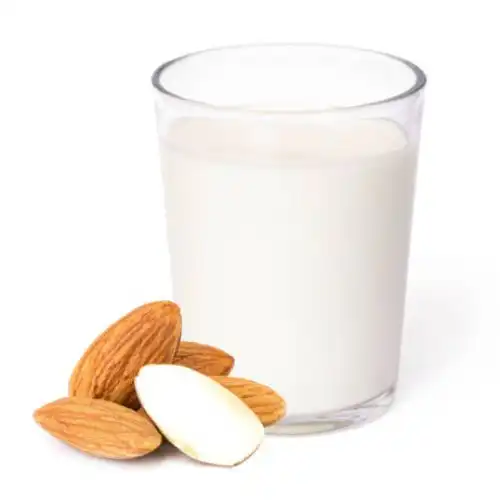Can Dogs Have Almond Milk? Find Dangerous Surprising Truth!
One question that often comes up for those who are more dog owners and explore the various food, and drink, options that they have for their furry companions is ‘Can dogs have almond milk.’ For humans, almond milk has replaced dairy milk quite a bit, especially for those who are lactose intolerant. The answer to dogs, however, isn’t so simple.

Let’s take a look into whether dogs can drink almond milk, its benefits, the risks you should be aware of, and how much it is okay to feed your dog.
Is Almond Milk safe for dogs?
Can Dogs Have Almond Milk? That’s where almond milk comes in as a plant-based alternative, it contains no lactose, a relief if you have a pet that’s lactose intolerant. So just because it’s safe for you humans doesn’t mean it’s always safe for the dogs. Almond milk is not dangerous, however, keep in mind the ingredients, especially added sugars or artificial sweeteners like xylitol (a little bit can be toxic!) as they can be.
Can Dogs Have Almond Milk?
Almond milk is safe for dogs as long as it doesn’t contain harmful additives like sugar or artificial sweeteners (especially xylitol), which can be toxic to dogs, but they can be eaten in small amounts.
The best way to spare your dog a small taste is plain unsweetened almond milk. However, it’s very important to remember that almond milk can be too much in moderation because it can cause issues such as digestive such as upset stomach or diarrhea.
Almond Milk for dogs: Is it healthy?
Can Dogs Have Almond Milk? Although almond milk can be a good treat for your dog, it’s not the best for them. While almond milk could be a bad choice for a dog, it does not contain essential nutrients needed in dogs’ daily diet such as protein, vitamins, and minerals as found in their dog food.
Almond Milk is not harmful in small doses but your dog shouldn’t be drinking this as a regular part of its diet, just like it shouldn’t be drinking water if there isn’t anything else available.

Is Almond Milk bad for dogs?
Can Dogs Have Almond Milk? Dogs can drink almond milk, but there are some things to remember. Almond milk is a processed form of almonds, though, and doesn’t digest naturally well for dogs anyway, and may still cause digestive issues in some dogs.
Also, any almond milk such as sugar, additive (such as xylitol), or other flavoring can be harmful or poisonous for dogs. A short one, but always make sure to check the label, get unsweetened natural almond milk if you do decide to share with your pet.
Benefits of Almond Milk for dogs
Although dog almond milk isn’t a big hit on nutrients, there may be some potential benefits. Being lactose-free, almond milk is better for dogs who are lactose intolerant. For occasional everyday taste and texture variety, it can be a good occasional treat for dogs. Although few, these benefits are negligible and almond milk should be enjoyed sparingly.
Dogs and non-dairy milk options
Dog owners aside from almond milk also have a few alternative non-dairy milk options available. Other plant-based options include oat milk, coconut milk, and rice milk. These alternatives, like almond milk, are best given in moderation and without added sugars and bad ingredients.

Almond Milk side effects for dogs
Can Dogs Have Almond Milk? Like any kind of milk, almond milk isn’t toxic to dogs but can cause some side effects from overconsumption. Side effects reported commonly include upset stomach, vomiting, or diarrhea.
The reason that happens is that dogs are not made to digest that almond milk right away. In addition, some dogs can develop allergic reactions and symptoms may include itching, swelling, or hives.
Can puppies drink Almond Milk?
Can Dogs Have Almond Milk? When it comes to milk puppy food has different requirements for its diet than adult dogs. Important nutrients for their early stages of development are provided by their mother’s milk, a puppy-specific formula, or some other artificial source. Almond milk doesn’t have the vitamins and calories a puppy needs to grow and prosper, so it’s best not to give almond milk to puppies at all.

Almond Milk alternatives for dogs
If you’re not trying simply milk alternatives for your dog then, rest assured there are plenty of specially formulated milks for your dog that are dog safe. Try goat’s milk, which is easier for dogs to digest than cow’s milk, and it may even provide probiotics and enzymes.
Dog-safe bowls of milk, available in pet stores, are made to meet dog’s specific nutritional needs without upsetting them stomach-wise.
Lactose intolerance in dogs and Almond Milk
Unfortunately, many dogs are lactose intolerant, or simply cannot digest the lactose found in cow’s milk. Lactose-free seems like it might be an alternative, like almond milk. However, this doesn’t mean that almond milk is the best substitute. While almond milk is safe for dogs, it’s also not a healthy addition, and all dogs still need to maintain a well-balanced diet.
Nutritional value of Almond Milk for dogs
Almond milk is not very nutritious for dogs. It is a rich source of vitamins like Vitamin E, but it won’t give a great amount that may contribute to the well-being of a dog. Almond milk is also low in protein, a nutrient that is important for a dog’s muscle development and overall good health. Not relying on almond milk as a source of nutrition for your dog, though, is important!
Should I give my dog Almond Milk?
Can Dogs Have Almond Milk? Almond milk is just fine for dogs, but not very often. If you decide to give your dog almond milk, make certain it’s plain, unsweetened, and free of harmful additives such as xylitol and sugar. Introduce something new to your dog’s diet slowly so that you can always be watching for signs of an upset stomach or a reaction.
Can Almond Milk cause allergies in dogs?
Some dogs can be allergic to almond milk. Like humans, dogs can have food allergies, and almonds may be an allergen. If your dog is allergic to almonds, he will display symptoms like itching, swelling, skin rashes, and gastrointestinal issues like vomiting, or diarrhea. If you think that your dog is allergic to almond milk, stop using it and consult your vet.
Can Almond Milk upset a dog’s stomach?
Almond milk is not bad for dogs, but it can make a dog sick if too much is consumed or with sweeteners. This means that not all dogs can digest the milk (this is true for a number of reasons, for example, some are sensitive to nuts or are allergic, and others just can’t digest almond milk) and dogs can develop gastrointestinal discomfort, such as bloating, gas, diarrhea, or vomiting. This is why you should only offer your dog a small amount of plain, unsweetened almond milk as an occasional treat.
Safe Almond Milk brands for dogs
If you pick out a sink of almond milk to serve your dog, be sure to go for a plain, unsweetened brand. Search for brands with little ingredients and steer clear of xylitol and lots of sugar. While some simple, organic almond milk might be a safe brand, always read the label, and never offer almond milk to your pet.
How much Almond Milk can a dog drink?
However, giving almond milk to dogs is really a matter of moderation. As an occasional treat, the amount should be a small one, a tablespoon or two. It’s best to start putting smaller amounts of hemp in your dog’s food first, watching to see how they do. Almond milk can also upset your dog’s stomach if he shows any signs of discomfort or gastrointestinal upset and in that case, it’s best to avoid all altogether.
Are there any health risks of Almond Milk for dogs?
Almond milk by itself isn’t toxic to dogs, but it comes with some health risks to consider. The thing to worry about when it comes to homemade dog treats is how many added sugars and other bad ingredients are utilized (xylitol, for example, can be fatal to dogs).
In addition, if a dog eats too much almond milk, it can get an upset stomach, diarrhea, or some other digestive problem. Always read the label and use almond milk in moderation.
Final Words
In short, almond milk can be fed to dogs, just in small quantities, wells, and checking for substances such as sugars or xylitol. While it sounds tempting to some lactose-intolerant dogs, almond milk is not a good food source for dogs, and should only be considered as an occasional treat, it’s a lactose-free milk, but its nutritional value is lacking. And as long as you’re doubtful, and you’re ever doubtful, always always always always consult with your vet before adding anything new to your dog’s diet.
What happens if my dog drinks almond milk?
Like all things, don’t seem to overdo it when feeding your dog with almond milk. An excess of almond milk can cause gastrointestinal problems such as diarrhea or vomiting. Give him a spoonful of almond milk and wait to see how it affects him before giving him more.
Is silk almond milk safe for dogs?
At first, we can give plain, unsweetened almond milk as an occasional treat, but it’s high in calories and may cause upset tummy, so don’t give it for regular. You can give your dog healthier treats in place of almond milk.
Can dogs have almond milk or coconut milk?
Even small amounts of plant-based milk such as soy milk, coconut milk, and almond milk are safe for pups to consume. Do not feed your pet any new human foods and call your vet and seek veterinary care if your pet starts to show a sign of lactose intolerance.
